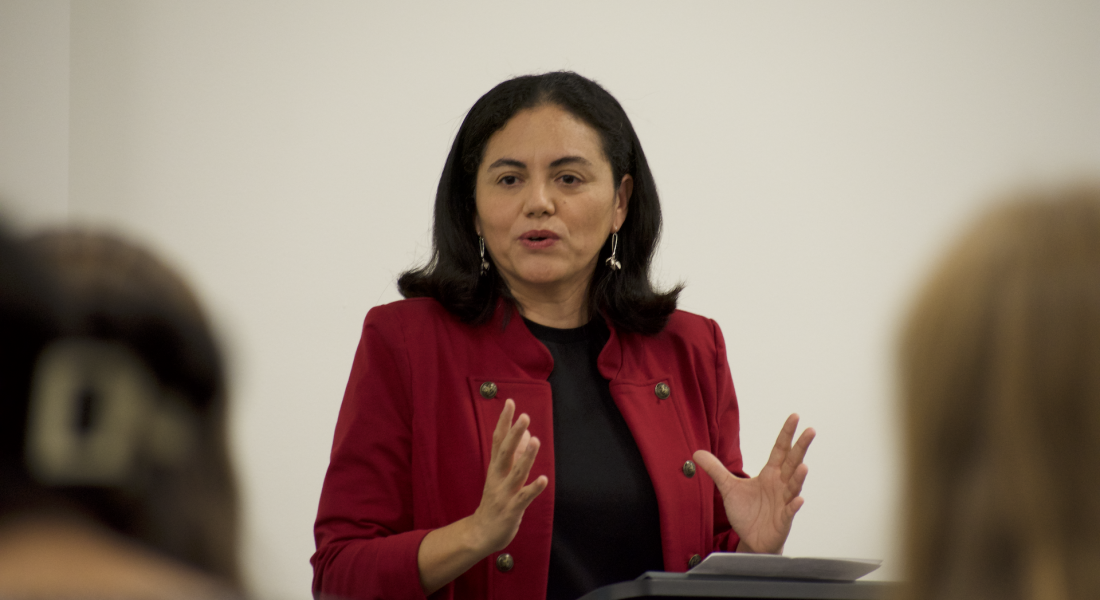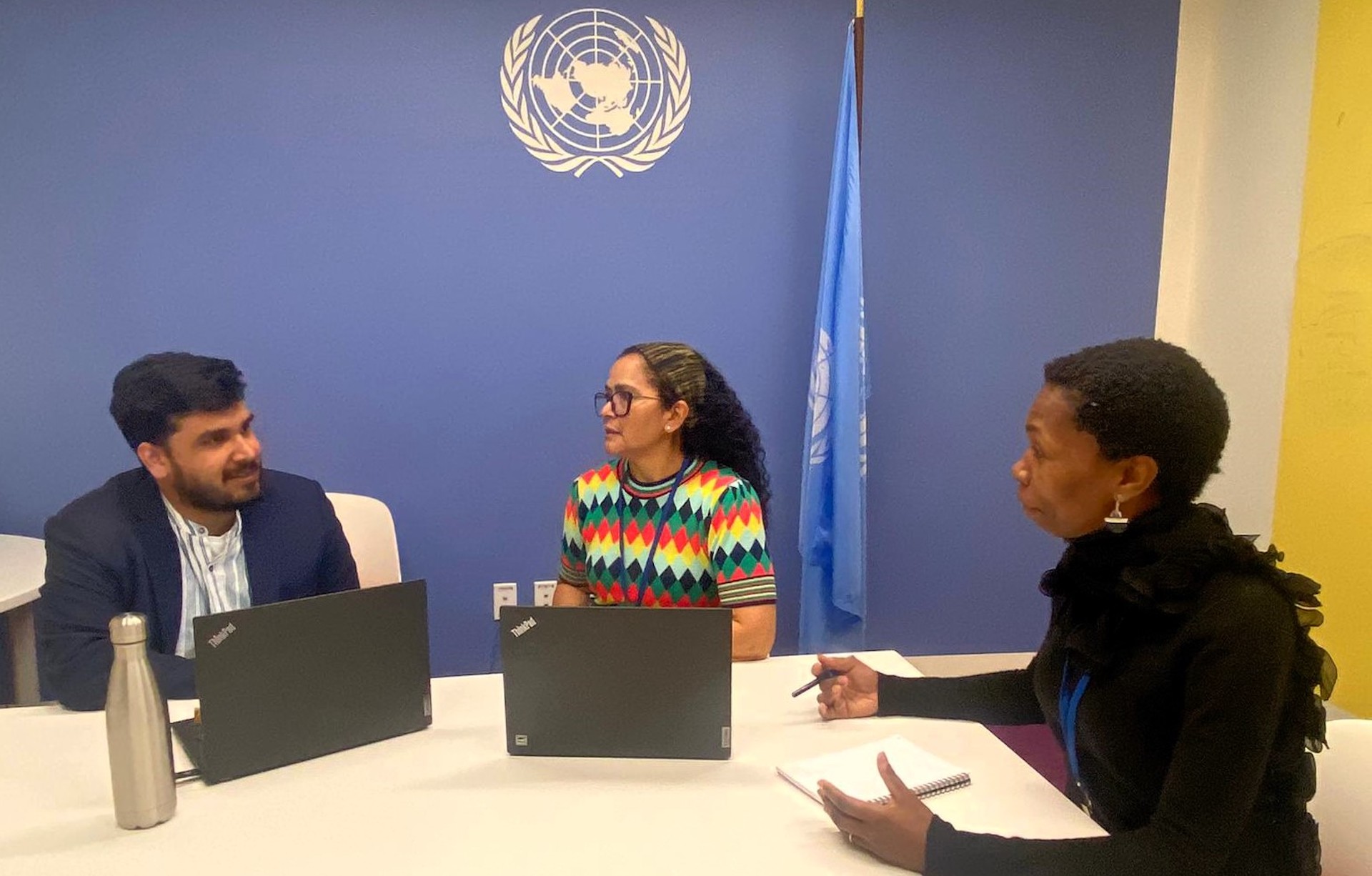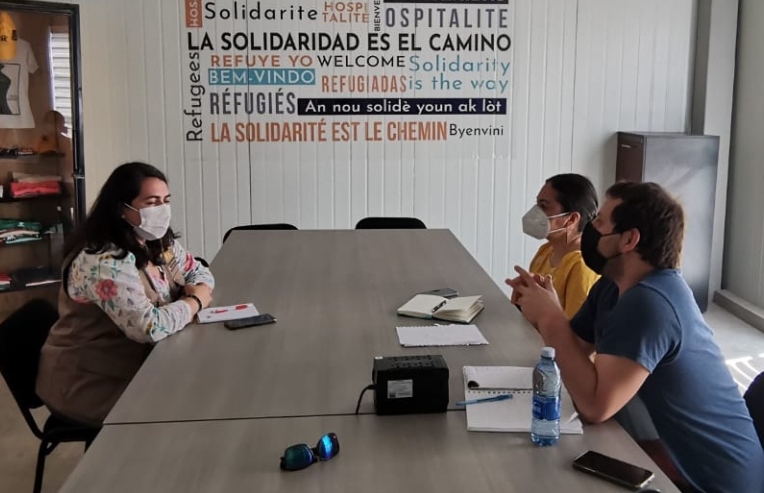
Growing up near San Salvador, Abby Córdova knew all too well the consequences of widespread violence against women (VAW) in her community. The associate professor of global affairs in the Keough School at the University of Notre Dame, a faculty fellow with the Kellogg Institute of International Studies, has committed much of her professional life to seeking solutions and is now launching the new Eliminating Violence against Women (E-VAW) Lab with support from Kellogg.
Research conducted through the E-VAW Lab will identify the structural causes of VAW in El Salvador, Mexico, and beyond, in service to policy responses that aim to effect change across the Global South. Among the new E-VAW Lab partners is UN Women. The Lab is working with UN Women El Salvador, and the "Ending Violence against Women Section" of UN Women in New York will host Córdova as a knowledge expert speaking at the Sixth UN Women Safe Cities and Safe Public Spaces Global Leaders’ Forum in Quito, Ecuador, from November 28 through November 30.
Kellogg International Scholar Isabela Tasende (political science and economics ’24), who is working with Córdova on VAW research, and Lena Shadow (global affairs-IDS and sociology ’24), now completing her International Development Studies project on VAW in South Africa with Kellogg support, also will be in Quito as part of the event. It coincides with the UN International Day on the Elimination of Violence against Women on November 25.
“I have been working with UN Women in El Salvador but also coordinating with UN Women in New York to find ways in which I can contribute to and inform their programming,” says Córdova. Her research builds on previous insights about the increased vulnerability to violence that women experience when living in militarized and gang-controlled neighborhoods – and the solutions that improve safety amid precarity.
For example, Córdova has previously studied the role of women’s police stations in Brazil and found that men are more likely to reject VAW in communities that have established a women’s police station. The men’s attitudes, including acceptance of bystander intervention, are reflected in lower rates of intimate partner violence. Her expanded book project will evaluate this women-led policing on a broader scale.
 The new lab will work closely with Kellogg’s existing Violence and Transitional Justice (V-TJ) Lab, directed by political science professor and Kellogg Faculty Fellow Guillermo Trejo. Córdova will work with Notre Dame researchers like international legal scholar Anivesh Bharadwaj, a Kellogg PhD Fellow focusing on gender-based violence and human rights, as well as other leading VAW scholars from various academic institutions.
The new lab will work closely with Kellogg’s existing Violence and Transitional Justice (V-TJ) Lab, directed by political science professor and Kellogg Faculty Fellow Guillermo Trejo. Córdova will work with Notre Dame researchers like international legal scholar Anivesh Bharadwaj, a Kellogg PhD Fellow focusing on gender-based violence and human rights, as well as other leading VAW scholars from various academic institutions.
“Conflict plays a major role,” says Bharadwaj, who focuses on legal structures – issues of under-reporting and under-prosecution of VAW, the risks and fear of retaliation, the limitations of court systems – in his approach to VAW, especially in contexts of armed conflict. For example, his research has identified the limitations of the normative frameworks in addressing VAW - to protect victims/survivors and in holding those accountable - such as the ambiguities in UN’s definition of sexual exploitation and abuse or the lack of a gender-based protection when seeking justice in the context of genocide. “Gender-based violence has not been addressed effectively,” Bharadwaj explains. “To begin, certain definitions need to change to reflect grassroots realities and evolving societies, while in other situations we need protection-oriented legal systems to better enforce existing laws and safeguard communities.” When he independently asked about a gender-based violence lab at Notre Dame, he connected with Córdova.
Across three years, the funding for E-VAW Lab will support workshops and conferences on VAW, too, providing a space for Notre Dame faculty and students to present their research and explore opportunities for collaboration. Córdova, named a Harry Frank Guggenheim Distinguished Scholar in 2022, engages in a number of interdisciplinary workshops and discussions that involve VAW, including a June 2023 training on migration held in partnership with the Organization of American States, Department of Social Inclusion.
The insecurity of conflict, gang control, and militarization compounds the VAW issue, making it harder to hold political elites and authorities accountable for the personal safety of women, Córdova explains. The impunity surrounding VAW fuels the spiral of violence at home and the drive to escape through migration to other countries.
 In Mexico, with support from the Ford Program in Human Development and Solidarity and local partners, including immigrants’ shelters and faith-based organizations, Córdova and Kellogg Doctoral Fellow Natán Skigin interviewed migrants from Latin America, Africa, and the Caribbean to evaluate how media can be used improve attitudes and drive policies that are responsive to migrant safety. On VAW, “the lab is going to have an agenda that examines how media campaigns can complement these other strategies,” says Córdova.
In Mexico, with support from the Ford Program in Human Development and Solidarity and local partners, including immigrants’ shelters and faith-based organizations, Córdova and Kellogg Doctoral Fellow Natán Skigin interviewed migrants from Latin America, Africa, and the Caribbean to evaluate how media can be used improve attitudes and drive policies that are responsive to migrant safety. On VAW, “the lab is going to have an agenda that examines how media campaigns can complement these other strategies,” says Córdova.
The new lab also will broaden opportunities for students like Adriana Abinader Arbaje (Psychology and Global Affairs ’24). Córdova serves as advisor to Abinader as she completes a capstone project on “Red Naranja,” a mobile-based app used in Mexico to prevent gender violence. The undergraduate research is funded with support from Kellogg and Notre Dame’s Kroc Institute for International Peace Studies.
Córdova notes that there are many other entities, including the Inter-American Development Bank’s Gender and Diversity (GD) Lab, that integrate VAW as part of their broader mission. But the E-VAW Lab is believed to be the first in the world to engage in research, policy, and practice that centers the role of state and criminal violence in its approach to VAW in Latin America.
“I’m thinking about a different model to address organized crime that doesn't rely on the military and militarized policing, a public security approach that puts women and everyone's safety at the center, which really protects human rights,” says Córdova.
“That's not what happens with a militarization approach.”
The Kellogg Institute for International Studies, part of the Keough School of Global Affairs at the University of Notre Dame, is an interdisciplinary community of scholars and students from across the University and around the globe that promotes research, provides educational opportunities, and builds partnerships throughout the world on the themes of global democracy and integral human development.





